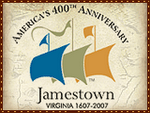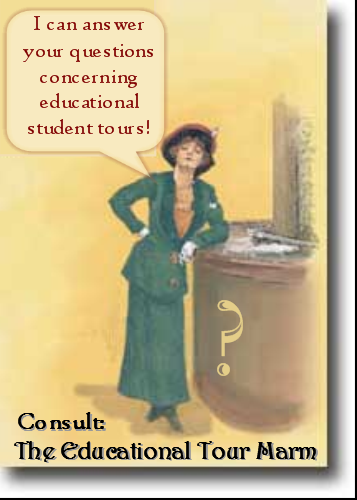March Madness for Educational Student Tours
Open Season Starts for Educational Student Tour Telemarketers!
It’s that time of year!
.
Old and new teachers are contacting me about their class trips for 2008 – before they have even traveled in 2007! It’s a different type of March Madness; a frenzied sales period throughout the industry! Large student tour operators have hired more telemarketing sales people to supplement their already large staff and are busily calling schools! These salespeople are supposed to be selling student tour 'packages'. (How many calls have you received so far?)
.
But it is no longer a ‘slam dunk’ that teachers who had been loyal to a particular company will remain with that company, because the bottom line is cost.
.
Teachers are actively seeking out other companies because of the spiraling expenses. Rising airfares, motorcoaches, hotels, and food, are making it difficult to provide a quality program. In fact, travel programs are becoming prohibitively expensive. It used to be far more economical for a group to travel, but with the introduction of efares, group bookings have become significantly more expensive than the advertised single fares one can find online. It is now costing from $425 to $650 for a West Coast group to fly non-stop, cross-country! (I have been lucky enough to find $358, but that was ‘off season’.) Motorcoaches have been affected by fuel prices and inflated insurance rates due to current security issues; the group also has to take care of the driver’s hotel room, food, and tip. This constitutes a big chunck of the total trip price and the result is diminished educational content.
.
The four years following September 11th brought about artificially lowered rates to get people to travel. On the fifth year, prices rose dramatically, some even quadrupling!
It’s that time of year!
.
Old and new teachers are contacting me about their class trips for 2008 – before they have even traveled in 2007! It’s a different type of March Madness; a frenzied sales period throughout the industry! Large student tour operators have hired more telemarketing sales people to supplement their already large staff and are busily calling schools! These salespeople are supposed to be selling student tour 'packages'. (How many calls have you received so far?)
.
But it is no longer a ‘slam dunk’ that teachers who had been loyal to a particular company will remain with that company, because the bottom line is cost.
.
Teachers are actively seeking out other companies because of the spiraling expenses. Rising airfares, motorcoaches, hotels, and food, are making it difficult to provide a quality program. In fact, travel programs are becoming prohibitively expensive. It used to be far more economical for a group to travel, but with the introduction of efares, group bookings have become significantly more expensive than the advertised single fares one can find online. It is now costing from $425 to $650 for a West Coast group to fly non-stop, cross-country! (I have been lucky enough to find $358, but that was ‘off season’.) Motorcoaches have been affected by fuel prices and inflated insurance rates due to current security issues; the group also has to take care of the driver’s hotel room, food, and tip. This constitutes a big chunck of the total trip price and the result is diminished educational content.
.
The four years following September 11th brought about artificially lowered rates to get people to travel. On the fifth year, prices rose dramatically, some even quadrupling!
.
Bam!
.
The days of, “Hey! Let’s take the kids on a trip!” are over. These programs have to be carefully planned well in advance and parents need to be prepared to pay for it, even before their sons and daughters enroll in the school that travels! (Hint: A savings account started in elementary school for the seventh or eighth grade makes a great deal of sense.)
.
If the trip is going to be expensive, why not get the most for your money? Make the trip count for something more than sightseeing.
.
The days of, “Hey! Let’s take the kids on a trip!” are over. These programs have to be carefully planned well in advance and parents need to be prepared to pay for it, even before their sons and daughters enroll in the school that travels! (Hint: A savings account started in elementary school for the seventh or eighth grade makes a great deal of sense.)
.
If the trip is going to be expensive, why not get the most for your money? Make the trip count for something more than sightseeing.
.
This is the perfect time to shop around to find out the differences amongst companies and the services they provide.
,
Many smaller educational tour operators are benefitting from the exodus of teachers from the larger companies, These teachers are trying to find more value and educational components to their programs. Most mom and pop companies do not have the huge profit margins and staff turnover of the larger companies and can provide personal service rather than a website and access number.
.
I try to work within the respective budgets of all my schools. (I have designed and conducted a couple of programs for practically no profit and no pay.) Most of the schools have fundraising campaigns that significantly defray the cost of the trip. If they work hard over the year, or two years, the out-of-pocket cost for the students (actually their parents) can be as low as $398 for a seven day, with all the bells and whistles experience that would normally cost over $2000! It’s hard work, but getting the parents and community involved also give the students a greater sense of focus and appreciation for the trip as opposed to entitlement.
.
Many of private schools (particularly ones associated with the NAIS (National Association of Independent Schools) close down for a week to accomodate various travel and outdoor programs; the cost of these is included in the tuition; it's a growing trend. They definitely understand that these experiences serve as a curriculum tool and are well aware of the intrinsic value to the students.
.
But how does one begin?
.
Normally, it begins with either a phone call or email from the company/designer or the teacher/administrator. It works from both ends. The topic of conversation usually covers the types of programs offered, past experiences, and costs. There are lots of questions on both sides. My favorite question to ask is: What do you want your students to get from this program?
Many smaller educational tour operators are benefitting from the exodus of teachers from the larger companies, These teachers are trying to find more value and educational components to their programs. Most mom and pop companies do not have the huge profit margins and staff turnover of the larger companies and can provide personal service rather than a website and access number.
.
I try to work within the respective budgets of all my schools. (I have designed and conducted a couple of programs for practically no profit and no pay.) Most of the schools have fundraising campaigns that significantly defray the cost of the trip. If they work hard over the year, or two years, the out-of-pocket cost for the students (actually their parents) can be as low as $398 for a seven day, with all the bells and whistles experience that would normally cost over $2000! It’s hard work, but getting the parents and community involved also give the students a greater sense of focus and appreciation for the trip as opposed to entitlement.
.
Many of private schools (particularly ones associated with the NAIS (National Association of Independent Schools) close down for a week to accomodate various travel and outdoor programs; the cost of these is included in the tuition; it's a growing trend. They definitely understand that these experiences serve as a curriculum tool and are well aware of the intrinsic value to the students.
.
But how does one begin?
.
Normally, it begins with either a phone call or email from the company/designer or the teacher/administrator. It works from both ends. The topic of conversation usually covers the types of programs offered, past experiences, and costs. There are lots of questions on both sides. My favorite question to ask is: What do you want your students to get from this program?
.
Many of you have to present the trip to parents, administration, school boards, and superintendents. What does this travel program truly represent and how can you justify the cost?
.
Since I do not have any generic itineraries or packages to offer, it is a bit harder to compete against the large student tour operators. Instead, I stress that I can custom design a program geared to curricula and teaching plans adding hands-on discoveries where appropriate. There are other people like me in the industry.
.
However, it is possible for a teacher/administrator to get a quality program from a large tour operator, if one has an idea of what one wants to accomplish with the trip. Teachers can tell the quality of the company by their willingness and ability to work with them to provide an educational, rather than sightseeing experience. The companies should be able to align their programs with SOL’s and curricula. If you are told that they cannot or will not do it, seek another company. Packages are designed for sightseeing.
.
The customer is now in control. The company should work for you, not the other way around.
.
With a little bit of research online, teachers can find out educational programs that are offered at various museums and historic sites. Many of these programs are free or of nominal cost and can significantly enhance the quality and enjoyment of the trip. The larger companies cannot offer these because of their volume; some museums can take only one or two schools a day. Most sales people don't even know these programs exist! It becomes the teacher's responsibility to suggest these programs.
.
One of the best tests for a full service educational tour company is the use of 24-hour tour guides/educational program conductors. In Washington, DC, there are hundreds of kid-friendly, student tour specialists who stay with the group from the moment they step off the plane to the time they reboard for their return home. These are not ‘escorts’ or bus drivers who pick up step-on guides in Washington or some other cities to give perfunctory city tours. These are fully qualified guides who not only pay all the bills, take care of the students in the hotel, give logistical support, and troubleshoot emergencies, but most importantly, they know their history and provide a cohesive educational experience throughout the entire trip; they become your best resource and on-site advocate while bonding with the students. They are fully trained, proficient, and professional. Accept nothing less. Again, if a company cannot or is unwilling to provide this essential service, seek another.
.
Other questions to ask concern the quality of the meals and where the hotel is located, but I will address that in a separate post.T here will be more in this series concerning the anatomy of the educational student tour.
.
Stay tuned!
.
The Educational Tour Marm
For a discussion of types of companies and ethics please visit this post.















